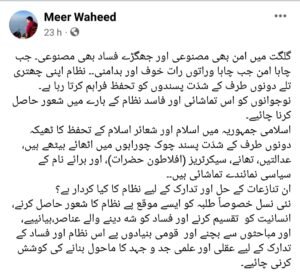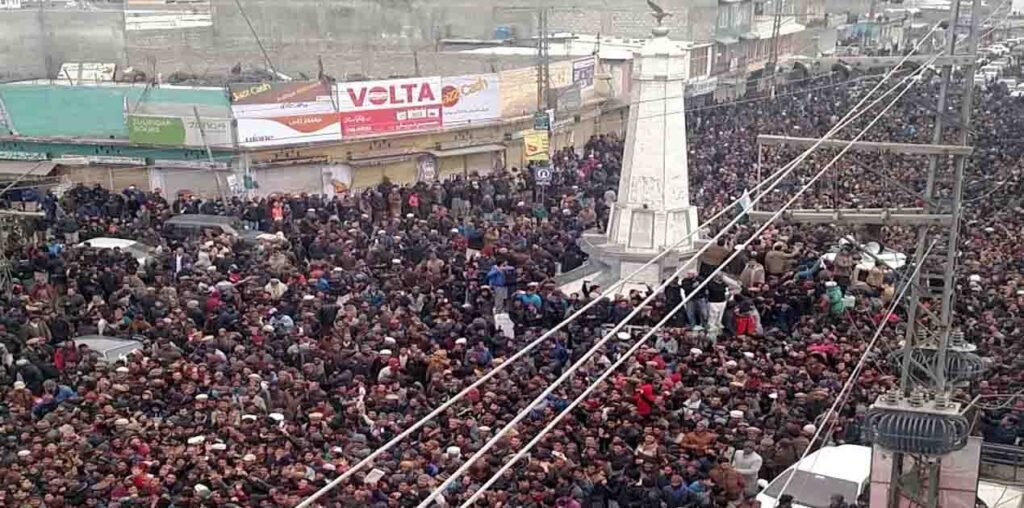What’s happening in Gilgit-Baltistan? Massive protests have erupted in Pakistan-occupied Gilgit-Baltistan over the detention of a Shia cleric under the country’s reinforced blasphemy laws.
The rallies are said to be the greatest in the region’s history. The local leaders in Gilgit warned the Pakistan government of civil war.
Skardu people protested after Shia cleric Agha Baqir al-Hussaini was booked and detained for remarks made at a religious gathering.
Also read: Missing Indian woman’s body found in Gilgit-Baltistan
Agha Baqir al-Hussaini was arrested for his remarks during an ulema council meeting in Skardu to debate Pakistan tightening its blasphemy laws, ostensibly to target the Shia population.
Pakistan has a Sunni majority, although Shias make up a sizable portion of the population of Gilgit-Baltistan. Beginning with Gen Zia-Ul Haq’s rule, successive Pakistani governments attempted to alter the demographic makeup of Gilgit-Baltistan by relocating Sunnis to the territory.
What’s happening in Gilgit-Baltistan?
Baltistan, Diamer, and Gilgit are the administrative divisions of the Gilgit-Baltistan area. Gilgit and Skardu are the primary administrative centres.
Despite the fact that the protests in Gilgit have received no attention in Pakistani media, videos and stories have emerged on social media, demonstrating the magnitude of the discontent. This, too, is a trickle, because the majority of it cannot be validated.
This is due to the Pakistani establishment’s stranglehold over communications in the occupied zone.
On August 22, Sunnis protested demanding the arrest of Agha Baqir al-Hussaini, according to accounts on X (previously Twitter). They obstructed the Karakoram Highway, which connects the mountainous region to Pakistan.
Protests were held in Daimer, where Sunnis predominate.
Shias have started putting out rallies in response to those protests and the arrest of cleric al-Hussaini, videos of which are now circulating on X.
Local leaders are also shown in videos saying that if the route remains closed, people will flock to Kargil rather than Punjab or Sindh.
They also threatened civil war if their demands for the release of al-Hussaini and the opening of the roadway were not met.
There have also been claims on X (previously Twitter) that the videos have been doctored. Some claim the videos show Shia demonstrators who have also been labelled as Sunnis.
But one thing is certain: there have been worries and complaints about al-Hussaini’s views.
In Pakistan, the minimum term for disparaging great figures of Islam has recently been increased from three to ten years in prison and a fine of one million Pakistani rupees under a revised law. The most severe penalty, which makes blasphemy a non-bailable offence, is a life sentence.
The blasphemy laws were previously changed to target Ahmadis, who had already been labelled non-Muslims.
Human rights campaigners are concerned about the possibility of persecution of minority groups, particularly Shia Muslims who hold negative views of some early Muslims.
The Human Rights Commission of Pakistan expressed worry that new amendments might unfairly mistreat minorities and groups due to Pakistan’s history of abusing these laws. This could lead to false allegations, abuse, and tyranny.
On the other hand, the Gilgit-Baltistan government has decided to call in the army to preserve law and order in the territory, according to reports on Saturday.
The decision was taken at a meeting of the Parliamentary Peace Committee, which was chaired by British Prime Minister Gulbar Khan. Given the region’s deteriorating law and order situation, the meeting resolved to station Rangers, scouts, and FC staff in major cities.
The meeting also voted to enforce Section 144 of the Criminal Procedure Code, a regulation concerning public order, across the region. Meanwhile, the GB government banned “illegal gatherings” and street blockades.
To maintain calm in the region, large contingents of Rangers, scouts, and law enforcement will be deployed in all major cities.
The Prime Minister of GB has warned of harsh repercussions for propagating hatred on social media and other platforms.
Taking a dig at the government, Dr Meer Waheed said that the “SYSTEM” is responsible for dividing people on non-issues for taking political benefits. He said that the system has been protecting extremists on both sides under its umbrella.
He urged that the youth should become aware of this spectator and corrupt system. Dr Waheed further said that the extremists on both sides believe that they are protecting Islam and its rituals but in reality they are being used by the corrupt politicians.
“The young generation, especially the students, at this point should gain awareness of the system, to avoid the elements, narratives, and debates that divide humanity and encourage depravity, and to make rational and intellectual efforts to remedy this system and corruption on a national basis,” he added.
Check his Facebook post here:

